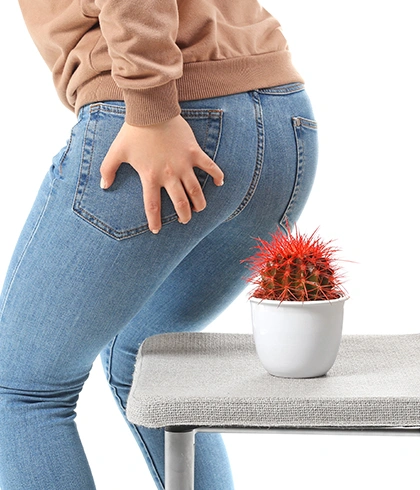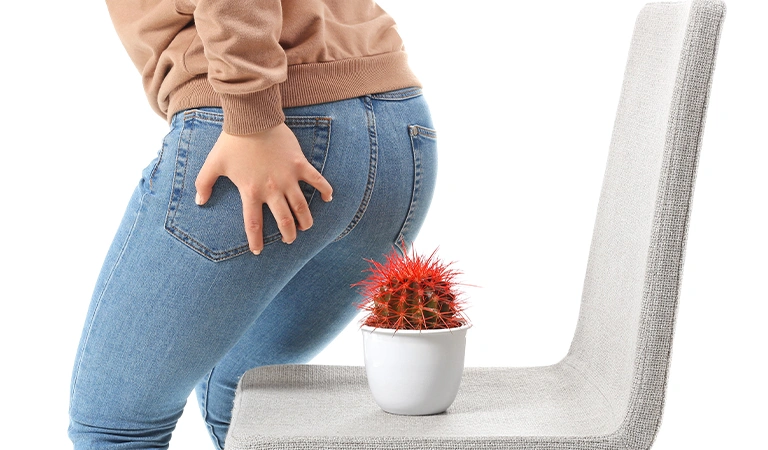

Natural Remedies for Piles: Homeopathy vs. Conventional Treatment
Piles, also known as hemorrhoids, are swollen blood vessels in the lower rectum and anus that can cause pain, itching, discomfort, and sometimes bleeding.
This common condition affects millions of people globally, with studies published on Medscape estimating that approximately 4.4% of the general population experiences symptomatic hemorrhoids.
In the United States alone, up to one-third of the 10 million individuals affected by hemorrhoids [Reference] seek medical treatment each year, leading to about 1.5 million related prescriptions annually. While hemorrhoids are most commonly seen in adults aged 45-65, they can occur at any age.
In today's high-stress lifestyles, poor dietary habits, and long hours of sitting are prevalent, piles have become a significant concern. The increasing reliance on sedentary work culture, coupled with diets low in fiber, has led to a rise in this condition in the region.
Consequently, there has been a growing interest in natural and holistic remedies for managing piles.
Why Natural Remedies Are Gaining Popularity Among Patients
Patients today are increasingly turning to natural remedies for managing a range of health conditions, including piles. The shift towards natural alternatives can be attributed to several factors:
- Safety: Many conventional treatments, especially long-term medications, can have side effects. Natural remedies are seen as safer, with fewer adverse effects.
- Non-invasive: Natural therapies are generally non-invasive, offering relief without the need for surgical intervention.
- Sustainability: People are looking for long-term solutions rather than temporary fixes that only mask symptoms. Natural remedies, like homeopathy, address the root causes of health issues, promoting lasting wellness.
This growing interest in holistic, patient-centered care is sparking a debate:
Homeopathy vs. Conventional Treatment for Piles.
Why Consider Natural Remedies for Piles?
The Appeal of Natural Remedies: Safer, Non-invasive, and Sustainable
Natural remedies for piles are gaining traction due to their ability to offer a holistic approach to treatment. Unlike conventional methods, which often only focus on symptom relief, natural remedies take into account the entire person— their lifestyle, diet, and overall health.
This approach not only alleviates the symptoms of hemorrhoids but also addresses the root causes, such as chronic constipation, poor dietary habits, and stress.
- Non-invasive: Homeopathic remedies do not require surgery, making them a more accessible option for individuals seeking relief without the need for medical procedures.
- Fewer side effects: Unlike conventional drugs or procedures, homeopathic treatments typically have minimal to no side effects, which is a significant draw for patients seeking a natural path to healing.
- Sustainability: Natural remedies aim to provide long-term relief by fostering balance in the body. Instead of providing short-term relief, like topical ointments, they focus on holistic healing that prevents recurrence.
Growing Interest in Holistic Treatments Like Homeopathy
Homeopathy is a system of medicine that emphasizes individualized treatment. It operates on the belief that the body has the innate ability to heal itself when supported by appropriate remedies.
This approach is especially appealing to individuals who are frustrated with the limited scope of conventional treatments or who want to avoid invasive procedures or pharmaceutical side effects.
As patients become more informed about the benefits of natural medicine, homeopathy’s role in addressing common ailments like piles has gained popularity, particularly in regions like the UAE, where there is an increasing focus on well-being and self-care.
Limitations of Over-Reliance on Conventional Approaches for Long-Term Relief
While conventional treatments such as topical creams, ointments, and surgical procedures may provide temporary relief, they often fail to address the underlying causes of piles.
Many patients find that their symptoms recur after a short time, leading them to rely on constant treatments. Furthermore, conventional methods may only mask the problem, leaving other issues—like diet, bowel movement habits, and stress—unaddressed.
How Homeopathy Works for Piles
Homeopathy is an individualized approach to treatment. Homeopaths take into account the patient's overall health, lifestyle, and personal symptoms to choose the most suitable remedy.
In the case of piles treatment, homeopathy focuses on understanding the root causes of the condition—whether that be chronic constipation, straining during bowel movements, stress, or poor diet.
Homeopathy’s key advantage is its holistic perspective: it doesn’t just treat the symptoms of piles, but works to strengthen the body’s natural ability to heal and maintain balance. By improving digestion, reducing inflammation, and supporting the body’s internal systems, homeopathy helps prevent the recurrence of hemorrhoids.
Benefits of Homeopathy
- Non-invasive: Homeopathic remedies do not involve surgery or injections, making them an attractive option for individuals seeking a gentle, non-invasive solution.
- No Side Effects: Unlike many conventional drugs that may have unwanted side effects, homeopathy is typically free of significant side effects.
- Root Cause Addressing: Homeopathy focuses on identifying and treating the underlying causes of piles (such as digestive issues, stress, or poor circulation), rather than just alleviating surface-level symptoms.
- Long-term Results: Since homeopathy treats the whole person and addresses the root causes, it offers the potential for long-lasting, sustainable relief.
Conventional Treatment for Piles
Conventional treatments for piles generally focus on managing symptoms rather than addressing the underlying causes of the condition.
- Over-the-Counter Creams and Ointments: These treatments often provide temporary relief from the itching, pain, and swelling associated with hemorrhoids. However, they don’t address the root causes of the condition and may only mask the symptoms.
- Minimally Invasive Procedures: Procedures like rubber band ligation or sclerotherapy may be used for patients with moderate hemorrhoids. These methods can help reduce the size of hemorrhoids but still do not address the underlying issues.
- Surgical Methods: For severe cases of hemorrhoids, surgery may be required. Hemorrhoidectomy, or the surgical removal of hemorrhoids, is often considered a last resort. It can be highly effective, but it carries risks such as infection, complications, and long recovery times.
Limitations of Conventional Treatment
- Temporary Relief: Conventional treatments tend to offer only short-term relief, as they often don’t address the factors that lead to the formation of hemorrhoids.
- Side Effects: Common side effects of conventional treatments include irritation, allergic reactions, or complications from more invasive procedures, such as infections or bleeding.
- High Costs: Surgical treatments are not only invasive but also costly. Additionally, long-term reliance on creams or other remedies can add to the financial burden of managing piles.
Homeopathy vs. Conventional Treatment
| Criteria | Homeopathy | Conventional Treatment |
|---|---|---|
| Approach | Focus on individualized, holistic treatment addressing root causes | Primarily symptom-focused, with limited long-term relief |
| Side Effects | Minimal to no side effects | Possible skin irritation, infections, or complications from surgery |
| Invasiveness | Non-invasive | Ranges from non-invasive creams to invasive surgeries |
| Long-Term Benefits | Sustainable, focuses on root causes, reducing recurrence | Often temporary relief, recurrence common |
| Cost | Affordable, especially with long-term use | Expensive, especially for surgical options or ongoing treatments |
Why Homeopathy Is the Preferred Choice for Piles Treatment in the UAE?
In the UAE, where there is a strong focus on health and wellness, homeopathy has emerged as a preferred choice for managing piles due to its gentle, non-invasive approach. Several factors make homeopathy particularly suited for individuals in the UAE:
- Gentle on the Body: Homeopathy is gentle, making it suitable for people of all age groups, including children and the elderly.
- Sustainable Results: Homeopathic treatments are tailored to the individual’s lifestyle, providing long-term relief without the need for repeated interventions.
- Proven Expertise: Clinics like Dr. Batra’s in the UAE have a proven track record in successfully managing piles and other conditions using homeopathy, making it a trusted choice for many.
- Accessibility: With numerous clinics offering homeopathic care across the UAE, patients have easy access to holistic treatments that focus on their well-being.
Conclusion
When it comes to treating piles, both homeopathy and conventional treatments have their advantages and limitations. While conventional treatments may provide quick relief, they often fail to address the root causes and can be invasive or costly.
Homeopathy treatment, on the other hand, offers a holistic, non-invasive approach that treats the underlying causes, promotes long-term relief, and carries minimal risk of side effects.
For patients seeking a natural, sustainable, and personalized approach to managing piles, homeopathy provides a compelling alternative.
With growing acceptance in the UAE and a focus on overall wellness, homeopathy is becoming a preferred option for those who want to heal naturally and avoid the limitations of conventional treatments.




